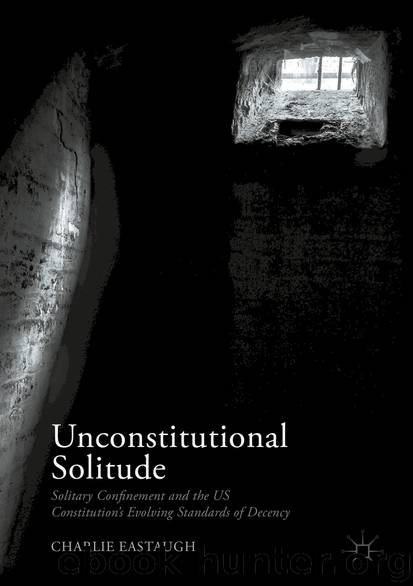Unconstitutional Solitude by Charlie Eastaugh

Author:Charlie Eastaugh
Language: eng
Format: epub
Publisher: Springer International Publishing, Cham
The Laboratories of Democracy
An ideal envisaged by the forefathers was that the independence and diversity of the states would guard against the tyranny of the majority. Forming a consensus from a crude nose-count is an obtrusive affront to this principle. Judgments that employ this method rest on the shoulders of ‘junk social science’,66 which is often vague and inefficacious. In addition—and more fundamentally—they are reminiscent of ‘Gerrymandering’, a term coined in 1812 to describe intentional partisan pioneering of electoral districts.67 Diversity among state legislatures should be regarded as the raison d’être of the federal system, not as the basis for informing federal constitutional law and subsequently constraining minority states.
Drawing on the metaphor of states-as-laboratories, Jacobi condemns the Court’s use of state counting as entirely antithetical to the ‘federalist ambition’68 of state sovereignty. While earlier literature scratched the surface of this federalist issue,69 those commentators underestimated the deleteriousness of state counting. The states-as-laboratories metaphor first appeared in a dissenting opinion by Justice Brandeis, who noted in 1932 that it was ‘one of the happy incidents of the federal system that a single courageous State may, if its citizens choose, serve as a laboratory’.70 Gardner has warned against taking this now-ubiquitous metaphor too literally, noting that ‘[s]tate courts do what they do, the Supreme Court does what it does, and from time to time some court somewhere may learn something useful by observing what the others have done.’71 Under an interpretivist reading, it must also be noted, some lessons are taught by recourse to principles embedded more deeply than in explicit legislative provisions. The Constitution places procedural and substantive limits on state power, and the Court does not require the results of such experimentation to find or impose those limits.
Under federalism , states are permitted, even encouraged, to engage in legislative experimentation. Where moral principles of decency come into play, however, such as those contained in the Eighth Amendment, individual rights trump such experimental privileges. Although the states-as-laboratories metaphor is now prolific in discussions of constitutional law, and deference to state power is the jewel in the crown of federalism , states must also be required to uphold the basic principles underlying the Constitution. Schwarz captures this argument well: ‘the laboratory of state experimentation is not a sealed room.’72 Indeed, where the Court finds an evolution of the Eighth Amendment against a certain practice, or experiment, laboratories in contravention of a constitutional right must be shut down, and future laboratories prevented from opening.
Since Chief Justice Marshall’s 1803 initiation of judicial review, and Chief Justice Warren’s 1960s incorporation revolution, judicial oversight is a rule in the constitutional law setting, not an exception. The Constitution is not an optional protocol, nor a set of guidelines, or even a policy objective, but a collection of basic minima. Take, for example, a state that introduces a punishment not explicitly barred by existing Eighth Amendment precedent: the long-term, intensive solitary confinement of juveniles or inmates with serious mental illnesses is a good example. Any state should, in
Download
This site does not store any files on its server. We only index and link to content provided by other sites. Please contact the content providers to delete copyright contents if any and email us, we'll remove relevant links or contents immediately.
Day by Elie Wiesel(2786)
The Age of Genius by A. C. Grayling(2592)
Gideon's Spies: The Secret History of the Mossad by Gordon Thomas(2356)
The Gulag Archipelago (Vintage Classics) by Aleksandr Solzhenitsyn(2106)
FATWA: Hunted in America by Pamela Geller(2013)
Columbine by Dave Cullen(1870)
Men Explain Things to Me by Rebecca Solnit(1729)
The Rule of Law by Bingham Tom(1702)
Anatomy of Injustice by Raymond Bonner(1671)
Examples & Explanations: Administrative Law by William F. Funk & Richard H. Seamon(1649)
Three Cups of Tea by Greg Mortenson(1621)
The Source by James A. Michener(1619)
That Every Man Be Armed by Stephen P. Halbrook(1584)
ADHD on Trial by Michael Gordon(1581)
Future Design by Unknown(1580)
Gideon's Spies by Gordon Thomas(1512)
Palestinian Walks by Raja Shehadeh(1499)
Constitutional Theory by Carl Schmitt(1458)
Nothing to Envy by Barbara Demick(1451)
